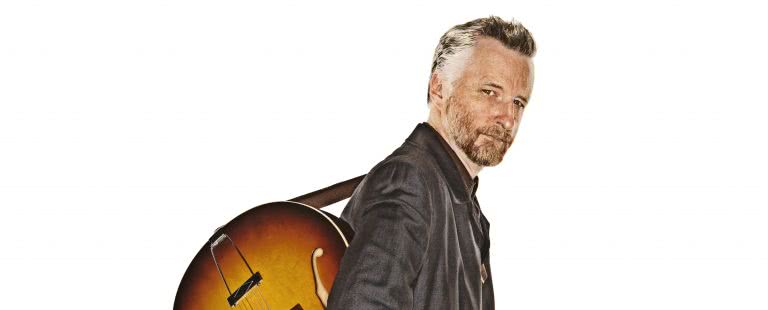In his 1989 essayThe End Of History?, philosopher Francis Fukuyama advanced a provocative proposition: that the demise of the communist governments in Eastern Europe signalled the end of the last great ideological battle. Bluntly paraphrased, Fukuyama contended that the tumultuous developments in Europe heralded the triumph of Western liberal democracy over its long-time ideological antagonists, fascism and communism.
It’s a proposition with which Billy Bragg strongly disagrees. In the 1980s Bragg waved the proverbial – and, on occasions, literal – red flag as the protagonist in the Red Wedge group of musicians, established originally to raise youth consciousness of the dangers of Margaret Thatcher’s conservative economic and social policies. The end of Conservative Party rule in England in 1997 didn’t soften Bragg’s commitment to progressive causes, with the singer continuing to champion the rights and interests of the marginalised and oppressed, both in his home country and abroad.
“The great ideological battle in history is between the people who have power and those who don’t,” asserts Bragg. “We might be in a post-ideological period where the language of Marx isn’t around, but the problems that Marx talked about are still here. I think Fukuyama is wrong to suggest that because the ideological challenge to the United States has passed, the problems and struggles of impoverished people have disappeared.”
Bragg’s passion for progressive causes is consistent with the tradition of the folk singers he adores: Woody Guthrie, the champion of the American working class and self-proclaimed musical assassin of fascists, and Pete Seeger, the elder statesman of the contemporary folk movement. Seeger, who was imprisoned in the 1950s for his conscientious refusal to dance to Senator Joe McCarthy’s political witch-hunt, died the day before this interview, at the ripe old age of 94.
Bragg is effusive in his praise of Seeger the folk musician and the political agitator. “Him being around at festivals, and his support in the making of Mermaid Avenue [Bragg’s album with Wilco of previously unreleased Woody Guthrie lyrics] was invaluable,” Bragg says. “I put a lot on the line with that project and Pete supported me all the way, and I’ll always be thankful for that. And on another level, I never got to meet Woody Guthrie or Lead Belly, and I’ve never met Bob Dylan, but when I shook hands with Pete Seeger, you’re just one step away from those people. And Pete was such an outgoing person, part of what he was doing was involving you in the project in the same way that he involved his audiences into what he was doing. And there’s not too many people who’ve got up onstage with Bruce Springsteen who were born in 1919!”
Bragg’s latest release – his first in five years – is Tooth & Nail, a collection of songs recorded with producer Joe Henry at Henry’s studio in Pasadena, California. Henry had suggested previously to Bragg that he come out to California to record some songs, an offer Bragg eventually decided to take up after helping his family settle the affairs of his mother, who died in 2011. While Tooth & Nail includes a couple of tracks that pay tribute to Bragg’s mother, Bragg says the album wasn’t so much part of the grieving process as a way of Bragg picking himself up and getting on with his life. “[Recording the album] helped by giving me a project to get on with,” Bragg says. “If I’d just have carried on in that space I was in, it would’ve slowed me down. My mum was a strong person – she didn’t like people whinging and complaining. She would’ve picked herself up, so it made a lot of sense to me to do the same. So the album isn’t about Mum passing, but there are some references to picking yourself up on there.”
Bragg had about half the songs written before arriving in California, with the rest written in the studio and immediate surrounds. ‘Handyman Blues’, Bragg’s apology to his wife Juliet for his unimpressive practical skills around the house, started out as a melody composed in Bragg’s head in the taxi ride to the airport, before being finished at Henry’s studio.
On ‘No One Knows Nothing Anymore’ (“It’s grammatically incorrect, but sounds better,” Bragg laughs), Bragg challenges the notion that contemporary society is smarter than its antecedents, notwithstanding the information available at our fingertips. “But I suppose you’ve got to hope that people’s curiosity keeps them searching for information,” he says.
And while the emergence and growth of social media has provided an electronic vehicle for modern-day progressive causes – Bragg was a vocal supporter of, and participant in, the Occupy Movement a couple of years ago – it’s also become a platform for the reactionary rhetoric that Bragg despises so strongly. “It does look to me as if social media has replaced pop music as the vanguard medium for talking about the world,” Bragg says. “But the downside is that the right wing has the same access. In the past, the right wing didn’t have access to popular music because pop music was almost always liberal, forward-looking, progressive – there was never really a right-wing Bob Dylan or Pete Seeger.”
Perhaps one of the more surprising tracks on Tooth & Nail is ‘Do Unto Others’, a track that invokes the language of the New Testament, and which was written as part of a project to celebrate the 400th anniversary of the King James Bible. Bragg is no fan of the excesses of the Church; however, he appreciates the philosophical basis of biblical texts. “You can find positive things in the Bible, without having to run into right-wing interpretations, to divide people,” Bragg says. “And I couldn’t be an atheist because I love gospel music so much,” he laughs.
Billy Bragg plays withCourtney Barnett atSydney Opera House Concert Hall on Sunday March 16.Tooth & Nail isout now through Big Dada/Inertia.

































